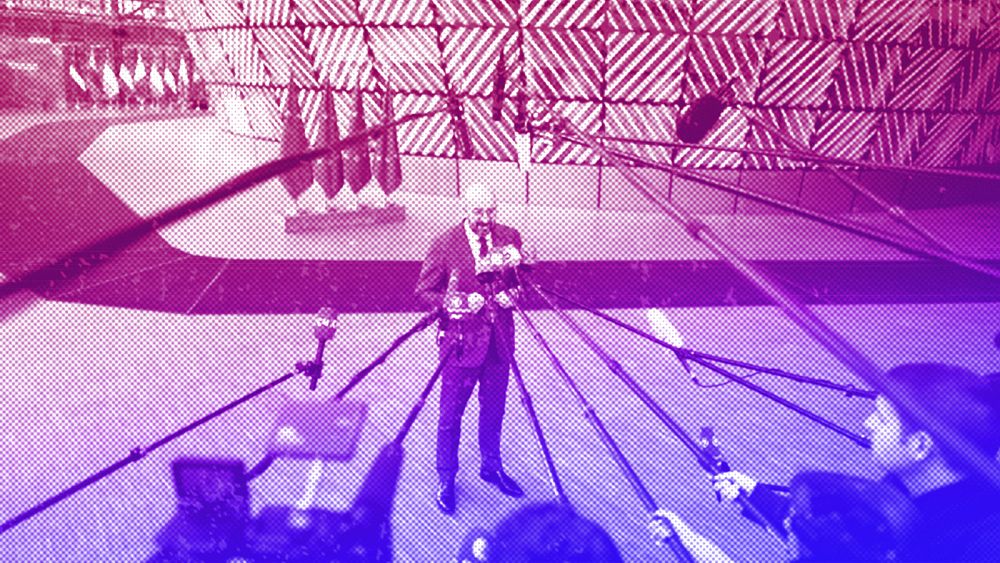
By Emma Bergmans, Policy Advisor, Free Press Unlimited, and Corinne Vella, Head of Communications, Daphne Caruana Galizia Foundation
EU member states claim a balance must be struck between the need to protect SLAPP targets and the need to ensure access to justice. We agree. SLAPP targets are no less deserving of access to justice than those who persecute them, Emma Bergmans and Corinne Velle write.
An EU directive to protect targets of judicial harassment holds high promise, but after negotiations between member states, it fails to translate European values into action.
Negotiations to determine the final text are currently taking place — it’s time that member states honour their commitment to press freedom.
SLAPPs are a form of abuse and intimidation
Independent journalism is under great pressure in the EU. An alarming trend in the past few years has been the sharp increase in legal intimidation as a tool to silence critical voices who report on matters of public interest.
This undermines the work of journalists and directly affects the public’s access to information.
So-called strategic lawsuits against public participation, SLAPPs, are on the rise against independent journalists and their media houses who report on facts that are inconvenient for those in power.
The Coalition Against SLAPPs in Europe documented 570 SLAPP cases between 2010 and 2021; their research showing an exponential increase in the use of SLAPPs since 2017.
Through the use of SLAPPs, wealthy and powerful individuals abuse the legal system to intimidate and coerce journalists, human rights defenders, and civil society organisations into silence.
Not only do SLAPPs seriously harm their targets both financially and psychologically — the damage also extends to the general public who are denied their right to information.
In the EU’s Charter of Fundamental Rights, the European Union commits to respect media freedom and pluralism, and to uphold freedom of expression — a priority, as this is one of the four pillars of modern democratic society.
Yet, member states have failed to translate their shared European values into concrete action. Instead, protecting individual national interests and the interests of powerful businesses seem to be getting the upper hand.
‘Daphne’s Law’ would not have protected Daphne Caruana Galizia herself
In April 2022, the European Commission took concrete action and published a proposal for an anti-SLAPP directive, which is symbolically nicknamed “Daphne’s Law” after the most famous target of SLAPPs: the Maltese journalist Daphne Caruana Galizia, who was murdered in 2017 and against whom 48 libel and defamation cases had been brought.
To this day, her immediate family is still entangled in a number of these lawsuits.
The proposal, as presented by the European Commission, shows great ambition and contains strong minimum standards for anti-SLAPP legislation in all EU member states.
Yet, the negotiations on the directive between European member states have resulted in a compromised position that lacks any ambition.
The Council of the European Union is proposing to water down or remove important safeguards, resulting in a proposed directive that would fail to offer any meaningful protection to journalists and activists who hold power to account.
Ironically, the Council’s version of Daphne’s Law would not have protected Daphne herself from the SLAPPs she was facing. The Council’s members should therefore adopt, at a minimum, the protections of the original anti-SLAPP proposal.
Is the bar for dismissal set too high?
In the Council of the European Union’s revised proposal, abusive court proceedings can only be dismissed early when “a claim is so obviously unfounded that there is no scope for any reasonable doubt”.
This is an extremely high threshold that is almost impossible to meet. It begs the question as to which cases would even be covered — a question which member states seem unable to answer.
Furthermore, in their negotiations, member states have removed the wide definition of “cross-border” cases, meaning the directive will not be applicable to the vast majority of SLAPPs which have cross-border relevance.
According to recent research published by the Coalition Against SLAPPs in Europe, roughly 90% of SLAPP cases in Europe are brought in the jurisdiction where the plaintiff and SLAPP target are both domiciled and would thus fall outside of the proposed directive, even if the case has cross-border relevance.
A slap on the wrist for repeat SLAPPers?
Finally, the Council has removed the provision for compensating SLAPP targets for the harm they suffer, thereby failing to facilitate their right to full compensation for related damages, both material and non-material, and failing to act as a deterrent for so-called repeat “SLAPPers” — people who routinely abuse the law to silence their critics.
To offer any meaningful protection, the directive needs to ensure victims of SLAPPs can easily claim and obtain full compensation for damages — including psychological harm — without having to file a separate claim.
Member states claim a balance must be struck between the need to protect SLAPP targets and the need to ensure access to justice.
We agree. SLAPP targets are no less deserving of access to justice than those who persecute them.
The anti-SLAPP directive must protect them effectively, and it is within member states’ gift to ensure that happens.
Emma Bergmans is the Policy Advisor on the Safety for Journalists at Free Press Unlimited, and Corinne Velle is the Head of Communications at the Daphne Caruana Galizia Foundation.
At Euronews, we believe all views matter. Contact us at view@euronews.com to send pitches or submissions and be part of the conversation.
